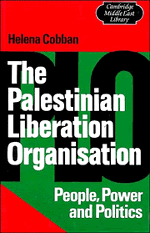Book contents
- Frontmatter
- Contents
- List of illustrations
- Preface
- Abbreviations
- Map 1 Palestine and the surrounding areas
- Introduction
- Part I History of the PLO mainstream
- Part II Internal relations
- 7 Non-Fateh guerrilla groups
- 8 The movement inside historic Palestine
- PART III External relations
- Conclusions
- Appendixes
- Notes
- References and select bibliography
8 - The movement inside historic Palestine
Published online by Cambridge University Press: 26 January 2010
- Frontmatter
- Contents
- List of illustrations
- Preface
- Abbreviations
- Map 1 Palestine and the surrounding areas
- Introduction
- Part I History of the PLO mainstream
- Part II Internal relations
- 7 Non-Fateh guerrilla groups
- 8 The movement inside historic Palestine
- PART III External relations
- Conclusions
- Appendixes
- Notes
- References and select bibliography
Summary
This study has already documented at some length the extent to which the Arabs' 1967 defeat marked a turning-point in the politics of the Palestinian diaspora: how much more decisive a development was it for those Palestinians who had remained within the boundaries of Mandate Palestine! Eight hundred thousand Palestinian inhabitants of East Jerusalem and the West Bank and 400,000 residents of Gaza were now brought under direct Israeli military rule. These figures include both traditional Palestinian inhabitants of the two areas and their substantial populations of refugees from within the boundaries Israel had staked out in 1948–49. Almost overnight in 1967, these Palestinians' relationship to Israel was transformed from a more or less remote, more or less idealistic, and generally indirect confrontation into the daily question of survival under an occupying power. For those Palestinians who had remained in their homes inside 1948 Israel, too (the ‘Israeli Arabs’, who now numbered about a half a million), Israel's occupation of the new areas was to have far-reaching consequences over the years ahead. For the first time in two decades they could reach out from the social and political isolation to which their citizenship of Israel had confined them and come into contact with virtually intact Arab societies in the West Bank, Gaza and (to a lesser extent) the Golan and Sinai.
These by-products of Israel's resounding military victory in 1967 were to have profound effects, over the 15 years which followed, on the goals, tactics and political make-up of the Palestinian national movement, which at the time of its revival in the late 50s had been based primarily on the struggle of the Palestinian exiles to return to their homes.
- Type
- Chapter
- Information
- The Palestinian Liberation OrganisationPeople, Power and Politics, pp. 168 - 192Publisher: Cambridge University PressPrint publication year: 1984



